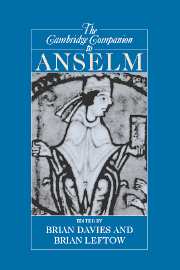Book contents
- Frontmatter
- Introduction
- 1 Anselm’s life, works, and immediate influence
- 2 Anselm on faith and reason
- 3 Anselm, Augustine, and Platonism
- 4 Anselm’s philosophy of language
- 5 Anselm on modality
- 6 Anselm’s perfect-being theology
- 7 Anselm and the ontological argument
- 8 Anselm’s account of freedom
- 9 Anselm on truth
- 10 Anselm on ethics
- 11 Anselm on the Trinity
- 12 Anselm on atonement
- Bibliography
- Index
7 - Anselm and the ontological argument
Published online by Cambridge University Press: 28 May 2006
- Frontmatter
- Introduction
- 1 Anselm’s life, works, and immediate influence
- 2 Anselm on faith and reason
- 3 Anselm, Augustine, and Platonism
- 4 Anselm’s philosophy of language
- 5 Anselm on modality
- 6 Anselm’s perfect-being theology
- 7 Anselm and the ontological argument
- 8 Anselm’s account of freedom
- 9 Anselm on truth
- 10 Anselm on ethics
- 11 Anselm on the Trinity
- 12 Anselm on atonement
- Bibliography
- Index
Summary
Immanuel Kant (1724-1804) claimed that there are only three possible ways of proving the existence of God by means of “speculative reason.” He called one of them “the ontological proof,” and it is often said that this (or “the ontological argument” as it is now commonly called) was first advanced by Anselm in Chapters 2 and 3 of his Proslogion. Anselm's collected works run to many pages, but nothing he wrote has commanded so much attention as these short texts. Yet what was he arguing in them? And how should we evaluate his reasoning? These are questions which have been answered in a bewildering variety of ways. In this chapter I aim only to present a brief introduction to the reasoning of Proslogion 2 and 3 together with some tentative suggestions as to how we might reflect on it.
FAITH, REASON, AND THE PROSLOGION
Anselm’s writings are not what some would regard as typical works of philosophy. Philosophers cannot, of course, avoid speaking from some viewpoint or other, but they often foster the impression that they seek only to follow “where reason leads,” and they encourage us to suppose that they have no serious beliefs to start with, especially religious ones. Anselm, however, rarely does this. Almost all of his writings are presented as the work of a committed Christian, and such is the case with the Proslogion. This text is conceived as a religious treatise from start to finish. It is even written in the form of a prayer.
- Type
- Chapter
- Information
- The Cambridge Companion to Anselm , pp. 157 - 178Publisher: Cambridge University PressPrint publication year: 2004
- 5
- Cited by



